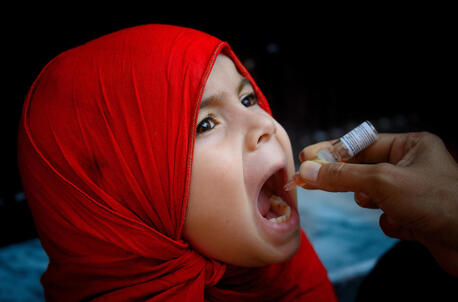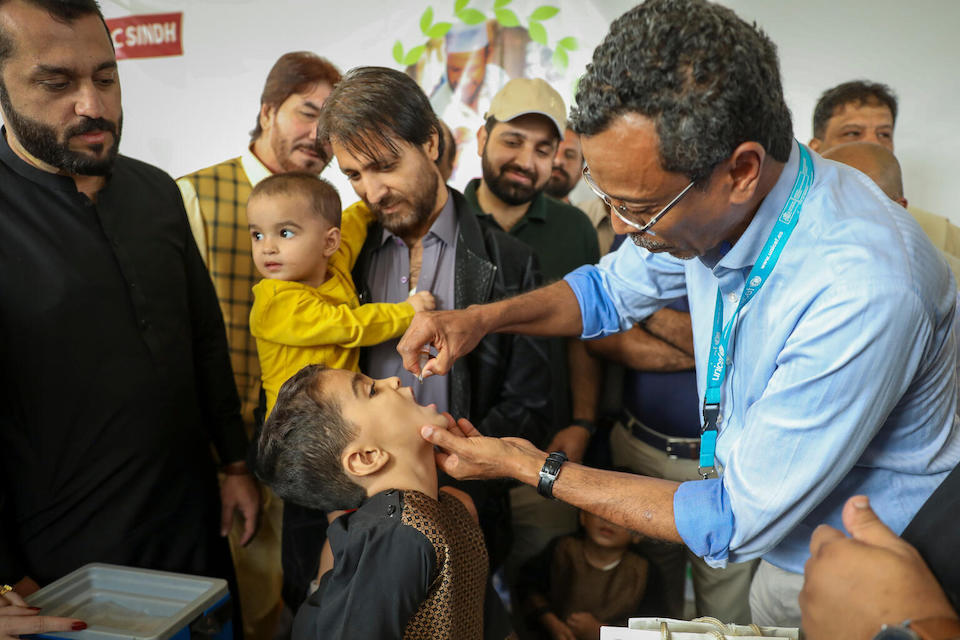
Polio Eradication and the Strengthening of Public Health Systems
With the wild poliovirus on the verge of eradication, the Global Polio Eradication Initiative (GPEI) offers a blueprint for addressing other infectious disease outbreaks and public health crises.
Polio’s defeat lies within reach.
Today, wild poliovirus (WPV) is endemic in just two countries with 12 existing cases between them: Afghanistan and Pakistan. Vaccination has eliminated the disease in every other country of the world. Vaccination campaigns aim to reach every child who remains unvaccinated in these countries — auguring a complete end to the transmission of WPV. The victory would make polio the second infectious disease, after smallpox, to be certified eradicated.
Among the many reasons to celebrate the polio eradication capstone is the creation of a durable polio infrastructure that can be integrated with national health systems to tackle other diseases and strengthen health emergency response systems.
For 35 years, the Global Polio Eradication Initiative (GPEI) has spearheaded a mass vaccination effort. Composed of national governments and partner organizations, this innovative international public-private partnership developed the knowledge, network and tools to conduct mass polio immunization campaigns. Rotary International, a GPEI founding member along with UNICEF, has played a distinct and integral role. Rotary’s advocacy, fundraising and community mobilization have made possible the immunization of 3 billion children since GPEI’s founding in 1988, when polio still paralyzed 1,000 children every day.
There is no cure for polio, only prevention
There is no cure for polio. This disabling and life-threatening disease primarily afflicts children under the age of 5, many of whom live in marginalized and underserved communities and lack access to safe water and adequate health services. Vaccination has prevented billions of children from contracting the disease and is the only way to wipe out polio completely.
Today, through national government and community health worker (CHW) engagement, 400 million children are vaccinated against polio every year, and cases have decreased globally by an astonishing 99.9 percent. Widespread vaccination has prevented an estimated 650,000 cases of paralysis every year and saved up to 60,000 children’s lives. Since GPEI’s launch, over 20 million people are walking who would have been paralyzed if not for immunization.

Rotary International has been a key player in the fight to eradicate polio
More than 1 million members of Rotary have contributed countless volunteer hours to polio eradication efforts.
Rotary’s steadfast generosity also boosts UNICEF’s vaccine procurement and distribution operations and complements CHW training and outreach efforts. Rotary’s global reach is on par with UNICEF’s own. With 1.4 million members in 200 countries, this international organization can field frontline workers and volunteers in polio-endemic regions. These community mobilizers dispel misinformation and gain the trust of parents and caregivers to vaccinate their children.
Rotary takes a “PolioPlus” approach to vaccination, by which the organization provides essential resources and supplies to create safer, healthier environments for children and increase public health care capacity. Poliovirus spreads from person to person through fecal-oral transmission. To halt the spread, Rotary has established local Polio Resource Centers in countries like Pakistan to address the behavioral and environmental conditions that cause outbreaks.
Polio immunization events offer children the chance to receive other primary health care and development interventions. The GPEI estimates that 1.5 million childhood deaths have been prevented through the systematic administration of vitamin A, which boosts the immune system, during polio immunization activities. Rotary’s PolioPlus actions can entail attracting people to vaccination days by also supporting projects to improve water, sanitation, and hygiene (WASH) conditions. This has included installing new boreholes to halt polio transmission and other water-borne diseases like cholera, diarrhea and hepatitis A. Resource Center workers have also distributed insecticide-treated bed nets to prevent deadly insect-borne diseases like malaria.
Vaccination campaigns are pivotal to meeting the under-5 mortality target for SDG 3: Ensuring good health and well-being for all at all ages. Children must be in good health to fully benefit from the multiple doses of polio vaccines that are required to fully protect them from the disease.
Experienced vaccinators like Safiullah Ahmadi go the extra mile to ensure every child is protected
Public health systems rely on skilled community health workers and local volunteers to build trust in immunization and other health services
Following eradication, the world must remain vigilant to sustain a polio-free world through strong disease surveillance and routine immunization. If we only work to control polio, there will be up to 200,000 cases a year.
The GPEI offers a blueprint for addressing other infectious disease outbreaks and public health crises. National governments and civil organizations have already adapted and incorporated elements of the polio infrastructure into public health systems. And because the success of mass vaccination rests on the perseverance of CHWs and local volunteers, many public health systems now have a highly skilled workforce that can break down cultural and religious barriers and build trust in immunization and other health services.
In Afghanistan’s Nangarhar province, Safiullah Ahmadi, a vaccinator for 28 years, travels with a vaccine-filled cooler on the back of a motorbike to reach every child. “In some areas, people don’t have access to clinics; therefore, we include them in our outreach plan, and everyone receives the services,” he explains.
Every child has the right to a healthy childhood, which is reason alone to celebrate the end of WPV circulation. The catalytic actions taken by the GPEI also deserve to be commended for creating a replicable, scalable model of surveillance, frontline workers and sophisticated data-gathering that has positioned the world to better fight disease outbreaks and provide essential services. Such continued innovation and vigilance in fighting diseases puts the world in a better position to reach SDG 3, especially the under-5 mortality target.
Learn more about UNICEF’s partnership with Rotary International.
HOW TO HELP
There are many ways to make a difference
War, famine, poverty, natural disasters — threats to the world's children keep coming. But UNICEF won't stop working to keep children healthy and safe.
UNICEF works in over 190 countries and territories — more places than any other children's organization. UNICEF has the world's largest humanitarian warehouse and, when disaster strikes, can get supplies almost anywhere within 72 hours. Constantly innovating, always advocating for a better world for children, UNICEF works to ensure that every child can grow up healthy, educated, protected and respected.
Would you like to help give all children the opportunity to reach their full potential? There are many ways to get involved.





